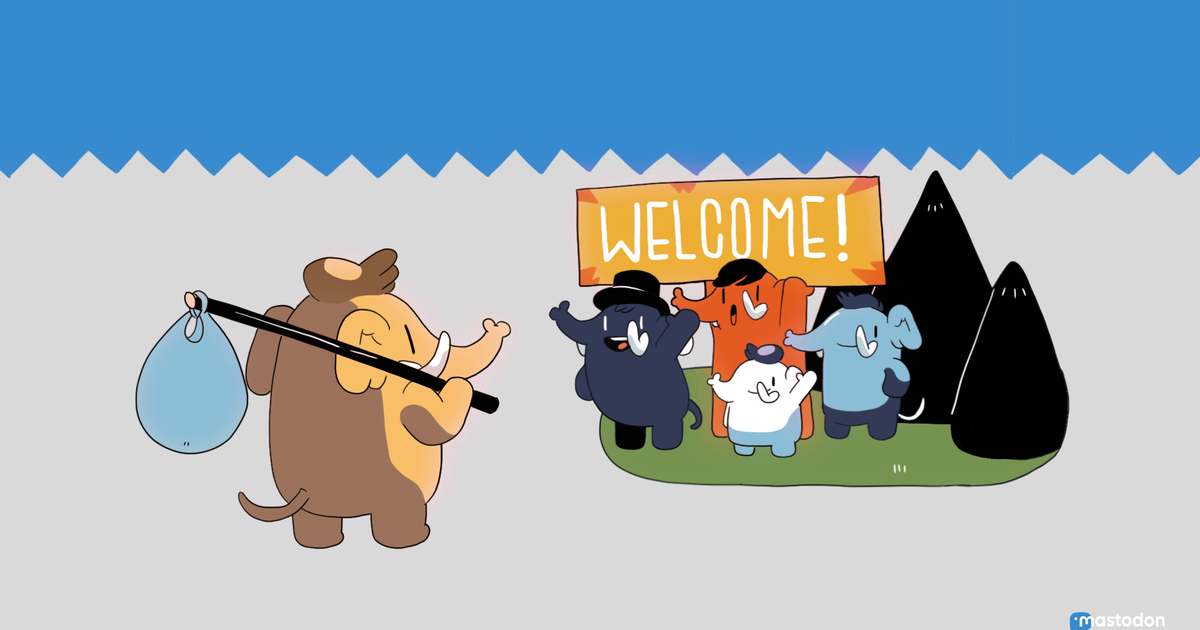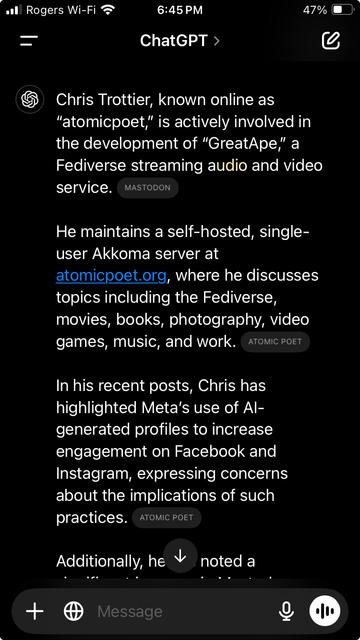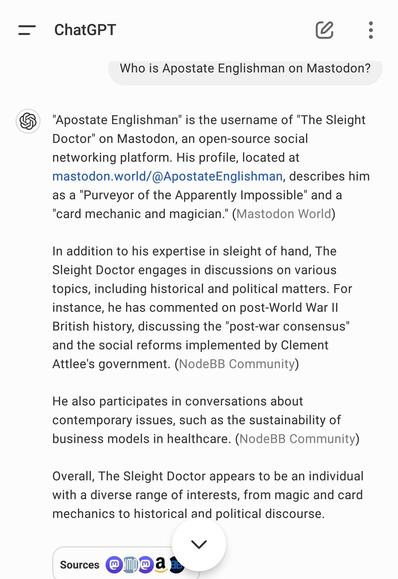So while people on Mastodon got angry about Mastodon having built-in discovery features, ChatGPT just went ahead and slurped up all your posts.
@atomicpoet They recently switched over to become more of a search engine if I recall.
Apparently, though, you are more well known than I am.
@majorlinux @atomicpoet It's got me. Accurate enough profile, so far as it goes.
It's a bit disturbing that it's apparently trawled everything I've ever posted, but I'm hardly surprised.
@ApostateEnglishman @majorlinux @atomicpoet That's what I want it to do when I'm asking it a question right? Do the search for me (guessing it's using Bing because of the more accessible API), and summarize the results. LLMs are relatively good at such a task.
@Schouten_B @majorlinux @atomicpoet Lots of folks didn't give their explicit consent to be indexed by search engines, whether traditional or "AI"-powered. They just don't want that, full stop.
No-one is judging you for not caring. You do you! But there are potential safeguarding and consent issues here that are of concern to some other people.
@ApostateEnglishman @majorlinux @atomicpoet If you want content to be private you would put it behind a login or some other kind of access control right? And if a service would then start digging that out and putting it in the public domain that should probably be a crime.
If you're putting up signs in your yard I'm not sure the service recording yard signs and indexing them is doing anything wrong. The service breaking into your home and indexing your letters is.
@ApostateEnglishman @majorlinux @atomicpoet I.e. if you're putting a piece of information out in public exposed by a specific, unrestricted, URL, that information itself is now 'public', and indexing that data feels mostly like a convenience thing. Respecting the robots file is courtesy at that point mostly I would say.
I feel the problem is people don't understand the concept of privacy anymore and aren't willing to put any effort into preserving it in the first place.
@Schouten_B
I don't think I would personally subscribe to such a one-sided definition of privacy anymore. Yes, it is important to be aware of and reduce the amount of personal information one puts on the net thus making it 'public'.
But I do not believe that privacy ends there: there must be a social contract and respect for one's privacy limiting the use of what is 'public'.
E.g. even if I don't have curtains, I expect people not to stare and film.
@ApostateEnglishman @majorlinux @atomicpoet
@Schouten_B
We have to be able to negotiate this contract when new technologies become available and affect our privacy in novel ways.
"Big data" type technologies such as LLMs can connect data traces and create profiles at scale. While scoring services have been doing this for a long time, the type of services we discuss now open opportunities for targeting and harassment.
We ought to decide what we want "public" to mean and what we consent to.
@ApostateEnglishman @majorlinux @atomicpoet
@hanno Thank you.
You managed to say everything I wanted to say, but was too annoyed to articulate.
"Well, if people don't understand how to keep themselves safe, that's their problem" isn't the hot take this person believes it to be.
@ApostateEnglishman
I don't think that was the point @Schouten_B was trying to make.
I would say his argument is simply along the lines of the current contract on which the net is built which is largely technocratical: what is allowed is defined along the lines of what is technologically possible, leaving privacy to the individual actions.
Without tech giants and surveillance capitalism that might work.
With the power imbalance, I'd say we need (data protection) laws. @majorlinux @atomicpoet
That is exactly the point he was trying to make, and I was trying to make as well (albeit in disagreement).
Power dynamics matter. There are lots of people with good reasons to want and need for it not to be *quite* so easy for anyone to target them for harassment or coordinated campaigns of intimidation.
It doesn't matter to me: anyone turns up here and it's FAFO time. But it matters a lot to those who are already systemically disadvantaged.
@Schouten_B @ApostateEnglishman @majorlinux @atomicpoet
In America, if you are standing near a large window in your home that faces the street, I cannot legally film you, even though your living room is easily seen from the street.
This is because of the legal standard of "reasonable expectation of privacy." At one time I had a PI license and had to learn this stuff.
You have the expectation of privacy because you are in your home.
1/3
@Schouten_B @ApostateEnglishman @majorlinux @atomicpoet
On the other hand, if you strip naked and do jumping jacks by that same window, you lose the "reasonable expectation of privacy" because you are doing something outrageous guaranteed to draw attention.
A public gym is a public place, so you can clandestinely film people in the course of an investigation.
A church is also a public place, but you cannot film people there.
Again, the standard is "reasonable expectation of privacy."
2/3
@Schouten_B @ApostateEnglishman @majorlinux @atomicpoet
If someone has a waist-high picket fence around their back yard, I can't film them while conducting an investigation. Even though people can easily see everything going on in the back yard, the fence creates an "expectation of privacy."
The point is, just because someone or something is in public does not mean rules of privacy do not apply. The legal standard I've discussed was from way before the Internet.
3/3
@tofugolem @ApostateEnglishman @majorlinux @atomicpoet I'm not sure about other jurisdictions, here in the Netherlands you would be allowed to film someone in such a setting, but you would not be allowed to publish the images without permission. Anyway.
I would personally argue that public URLs are a public place. Not a private place. A reasonable expectation can exist on your conversations in signal, login-only forums, etc. Not, I would argue, for what you publish publically on social media.
@Schouten_B @ApostateEnglishman @majorlinux @atomicpoet
Again, my entire point is that even when something is in public, that doesn't mean anyone can do whatever with it.
@tofugolem @ApostateEnglishman @majorlinux @atomicpoet No, but I would argue indexing is something that is perfectly reasonable. But that is obviously a matter of opinion .
@Schouten_B @ApostateEnglishman @majorlinux @atomicpoet
Any amount of training for AI is unacceptable.
@tofugolem @ApostateEnglishman @majorlinux @atomicpoet In this case training is unlikely to be related. The model executed a search (presumably using Bing is my guess) and analyzed the results. This data is extremely unlikely to have been included in the training set. (if it had been the URL would have also not been referred to)



